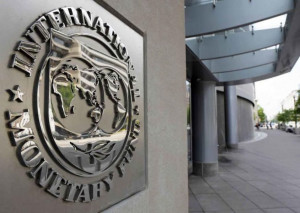
NIGERIA’S GDP PER CAPITA SHRINKS TO $835 — IMF

The International Monetary Fund has revealed that Nigeria’s Gross Domestic Product per capita declined to $835.49 in 2025 from $877.07 in 2024, indicating a 4.74 per cent dip.
According to data from the IMF website on Thursday, there has been a sustained downtrend since 2014, when the GDP per capita had stood at a high of $3,220.
Gross Domestic Product is the most commonly used measure of a country’s overall economic activity. It represents the total value at current prices of final goods and services produced within a country during a specified time divided by the average population for the same year. GDP per capita measures the average standard of living of a country’s citizens.
The IMF, however, projects a rise in 2026 and 2027, with the GDP per capita expected to cross the $1,000 mark in 2028 at $1,040.
The data also revealed that Nigeria and the majority of countries in sub-Saharan Africa are within the $500 to $2,500 GDP per capita band, with some below $500.
This decline comes amid a rebasing of the GDP by the National Bureau of Statistics, which will bring new sectors of the economy into consideration.
The new additions to the rebased GDP as announced by the National Bureau of Statistics were digital economy activities, pension funds, the National Health Insurance Scheme, the Nigerian Social Insurance Trust Fund, the activities of modular refineries, domestic households as employers of labour, quarrying and other mining activities, and illegal and hidden activities.
Despite the decline, the latest Purchasing Managers’ Index from Stanbic IBTC Bank indicated confidence in the business environment in Nigeria is on the rise, as reflected in increased output for the second consecutive month.
According to the latest PMI report, the budding growth in the Nigerian private sector seen at the end of 2024 was sustained into the first month of 2025, with new orders and business activity each continuing to rise.
Commenting on the report, the Head of Equity Research West Africa at Stanbic IBTC Bank, Muyiwa Oni, said, “Nigeria’s private sector activity sustained its improvement in January 2025, albeit lower than levels seen in December 2024. We note an increase in both output (53.7 vs. December 2024: 54.8) and new orders (52.6 vs. December 2024: 53.2), although slightly weaker than that seen at the end of 2024, on account of improving customer demand and more willingness to commit to new projects. Given the rising new orders, companies took on additional workers in January—representing the second month running in which this has been the case.
“Elsewhere, input prices increased at a slower pace while the pace of increase in output prices is the slowest since July 2024. Headline inflation averaged 33.1 per cent y/y in 2024 from an average of 24.52 per cent y/y in 2023, mostly driven by significant FX depreciation; renewed petrol price increases in line with full petrol price liberalisation; structurally low food supplies exacerbated by high extreme weather conditions; and increased food demand, especially during the festive season.”
Meanwhile, the IMF had projected that for Nigeria, 2025 real GDP growth would be 3.2 per cent while inflation is estimated to drop to 25 per cent in the same year.
The projected GDP growth is lower than the 5.5 per cent estimated by the Nigerian Economic Summit Group, which recently launched its 2025 Macroeconomic Outlook Report under the theme ‘Stabilisation in Transition: Rethinking Reform Strategies for 2025 and Beyond.’
NESG Chief Economist and Director of Research, Olusegun Omisakin, during his presentation, said, “A GDP growth rate of 5.5 per cent is achievable if Nigeria continues with stability-focused reforms. However, inefficient policy implementation and economic constraints could limit growth to 3.4 per cent, and a reversal of reforms could see it drop to 2.7 per cent. The quality of policy execution in 2025 will determine whether Nigeria reaches its stabilisation goals or falls short.”
At the same event, the Governor of the Central Bank of Nigeria, Olayemi Cardoso, projected that the economy will grow by 4.1 per cent in 2025, as well as a record decline in inflation, with continued increases in foreign exchange inflow into the country.
Cardoso said, “Estimates of key economic indicators suggest a positive outlook for 2025 in particular; GDP growth is projected to rise to 4.17 per cent in 2025 from 3.36 per cent in 2024.
READ ALSO:
DISORDER AS IGP, PSC CLASH OVER RETIREMENT OF POLICE OFFICERS
“This growth is anchored on sustained implementation of government reforms, stable crude oil prices, and improvements in domestic oil production. Increased refining capacity, driven by the Dangote refinery and the revitalisation of the Port Harcourt and Warri refineries, should significantly enhance economic activity. A stable exchange rate will also play a crucial role in maintaining this positive trajectory. Domestic inflation is projected to decline in 2025 as the impact of economic reforms begins to take hold. Achieving our overall objectives requires effective collaboration between monetary and fiscal authorities alongside private sector participation.”
